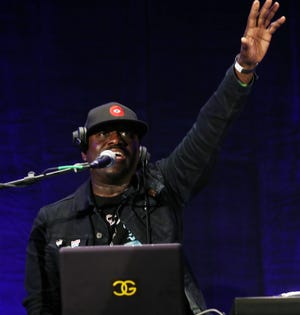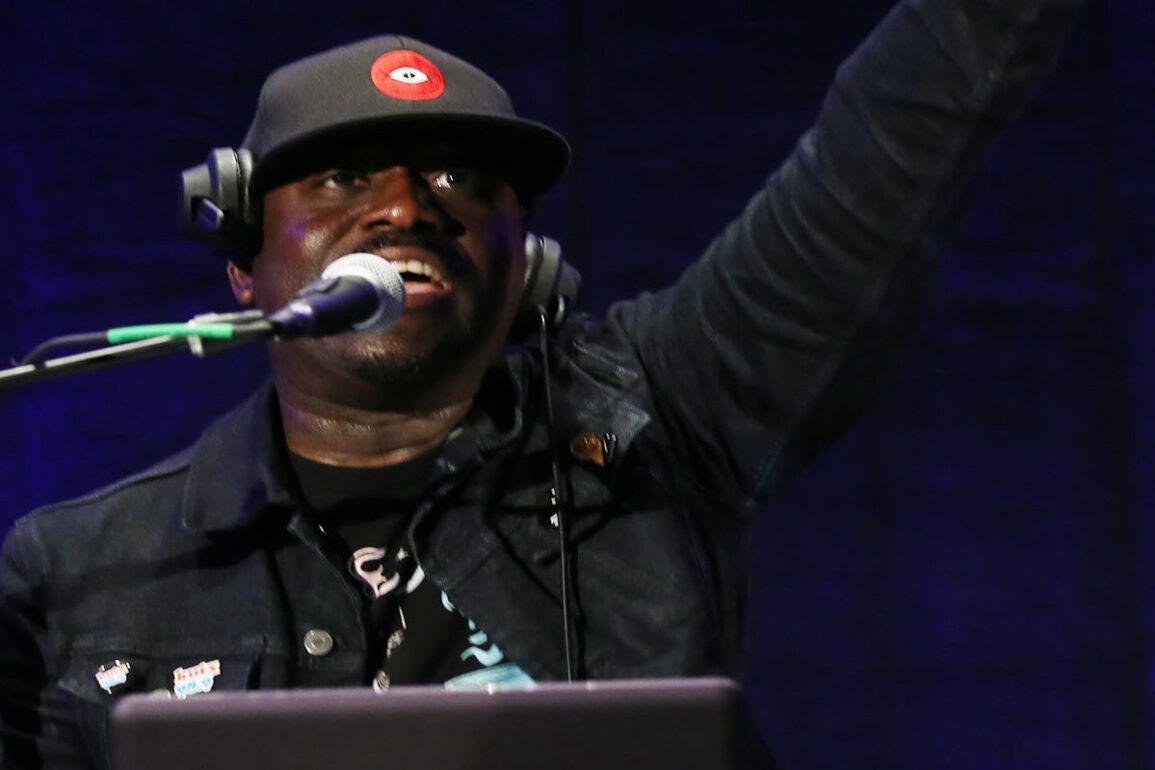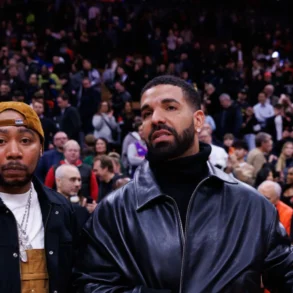
An eclectic and soulful musician who elevated DJ performance to artistry, and a powerful force of kindness and collaboration in Austin’s creative communities, Jeffrey Henry (aka DJ Chicken George) died May 10 in Houston following a two-year battle with cutaneous T-cell lymphoma, a rare form of cancer. He was 50.
Anyone who spent time soaking in the Austin music scene of the 21st century undoubtedly spent more than a few sweaty nights moving to the beats emanating from the DJ, whose professional branding (a stylized “CG” that resembled the Gucci logo) was as instantly recognizable as his sound.
DJ Chicken George pioneered a style he called ‘jazztronica’
Henry blended soul, funk, house, jazz and electronica — he coined the term “jazztronica” to describe his style — for textured, global-influenced grooves that made the Warehouse District and bars like Red Fez and Malverde the places to vibe and dance in the first decade of the 2000s.
His signature sound made its way across the country and around the world, with media, musicians and tastemakers from Los Angeles to New York City championing Henry’s work, which found fame in places as far away as Sweden.. Henry, whose career and personal impact earned him a place on Austin’s unofficial Mount Rushmore of DJs, felt like the city’s house DJ for almost 20 years. He popped up at events all over town and regularly opened for touring acts like Grandmaster Flash, Snoop Dogg and Erykah Badu.
Need a break? Play the USA TODAY Daily Crossword Puzzle.
Born, along with twin brother Jerry, in Boston in 1973, Henry and his family moved to Texas in 1981. Music was a constant presence in the family home. Irene and Anthony Henry played the Afro-Caribbean polyrhythmic music of their native Trinidad in the house, where the sounds of everything from John Denver to Helen Reddy and Motown to Elton John were equally prevalent.
That array of diverse influences would leave an imprint on Henry’s musical soul, but it was his exploration of socially conscious late 80s-early 90s East Coast hip hop acts like De La Soul and A Tribe Called Quest that inspired a life spent digging into the crates of jazz, funk and soul records sampled in those artists’ tracks.
Listen:Check out mixes from DJ Chicken George on his Soundcloud page
‘Jeff was about the music and also about the struggle.’
The Henry brothers formed the hip hop group Bass Tribe, with Jeff’s future Third Root collaborator Marco Cervantes (Mexstep), while students at Houston’s MacArthur High School. Jeff moved into the DJ role for the quartet, establishing his future path behind the decks.
He started performing as DJ Chicken George shortly after high school, the moniker taken from the Ben Vereen character in the television adaptation of Alex Haley’s “Roots.” Anthony Henry had played the miniseries for his children in their youth to make them aware of American history. It not only gave Jeff his nickname, the show left a lasting impression on the Henry brothers’ social and political views, according to Jerry Henry, an accomplished cinematographer and documentary filmmaker.
“Jeff was about the music and also about the struggle. Third Root’s music is that,” Jerry Henry told the American-Statesman about his brother, referencing the hip hop trio with which Jeff performed in the last decade of his life.
Henry, who graduated from the University of Houston Downtown, built the first act of his career in Houston. He hosted a radio show on community-supported KPFT, worked in promotions for Rap-A-Lot Records and performed live around the Bayou City, establishing himself, along with musicians like DJ Sun and DJ Melodic, as one of the city’s leading underground DJs.
‘He was kind of two steps ahead of everybody.’
A move to Austin birthed the next evolution of Henry’s career. An opening show at Mojo’s Daily Grind on the Drag (following in the coffee shop footsteps of Henry’s regular gigs at cafe Brasil in Houston’s Montrose neighborhood) was followed shortly thereafter by a weekly residency at Red Fez in the Warehouse District that proved to be one of Austin’s top draws for those with a good ear for grooves and a desire to move.
“He brought something that wasn’t around,” Red Fez founder Matt Luckie told the American-Statesman. “He brought such inspiration. He had a different swagger to him. He was kind of two steps ahead of everybody.”
Fellow Mount Rushmore Austin inhabitant Mel Cavaricci (DJ Mel), who started playing in Austin in the mid-90s, said that Henry completely owned his lane in those early years and was able to successfully translate his expertly curated eclecticism wherever he went.
“I think he really enjoyed always being this selector and going deeper,” Cavaricci said. “He didn’t waver. He didn’t deviate from that path. He was very true to himself and very authentic, and that’s what we were all drawn to. No ulterior motives, no angles, nothing. He’s just being himself. That’s what I loved about him, whether it was his DJ sets or him as a person.”
Henry was always about the music, as anyone who knew him will attest, but the former college marketing major also had a mind for business and an innate understanding of how to resonate with listeners on multiple levels.
It was at the time of his Red Fez residency that Henry met marketing, design and brand consultants Rae and Stephen Donovan, who worked with Henry to create his signature logo and branding, which made its way onto everything from T-shirts to hats and air freshener tags that became cool cache for those in the know.
In an age before the term “personal brand” became an unnerving part of the social media-pumped lexicon, the ubiquitous Chicken George logo grew to represent more than just the man, but also the creative, collaborative and inclusive ethos and vibe Henry represented in a community he helped bond and build. The interlocking “CG” may as well have represented the Venn diagram overlay of the myriad cultural spheres Henry brought together.
More:Third Root’s ‘Passion of the Poets’ makes a powerful call for Black and brown unity
‘He had a tectonic impact in Austin.’
“I just see him as such a unique pillar of the community in so many ways,” Rae Donovan said. “Above all, he was a dynamic collaborator. It boiled down to his talent but also his pure intention of connecting with people and all of the heart he put into all the different circles he was in. I feel like he had a tectonic impact in Austin.”
Henry quickly made himself an integral part of the fabric of Austin’s hip hop and broader musical communities with an eclectic but personal style that pulled from an array of genres. Before artists like Diplo had popularized the idea of an “open format” DJ, Henry had mastered the form.
Music programmer, event producer and tastemaker Matt Sonzala, who became a fan of Henry’s when he was still in Houston, said the DJ pulled off a feat that can be hard for someone mixing other people’s records: He created a signature sound.
“You knew that was his mix CD. You could just feel it,” Sonzala said of Henry, whose CDs and Soundcloud mixes became favorites in the Austin scene. “You hear a guitar player and you think, ‘Oh that’s him.’ Only some DJs really have a signature sound like that. He’s up there not just with some of the best Austin DJs but with some of the best music in Texas in general. And he showed the world that Texas music is not just one thing.”
‘No one was touching him as a DJ,’ or as a friend
Henry was not resigned to a life behind the decks as a solo artist. He partnered with the label Austin Boogie Crew to produce and distribute more than a dozen albums and enjoyed success as a collaborator on projects with the likes of Brownout, the Latin funk spinoff of Grammy-winning Grupo Fantasma. He even taught Grupo co-founder (current Black Pumas guitar wizard) Adrian Quesada the building blocks of DJing.
“DJ Chicken George was a DJ, a father, a promoter (the ultimate hustler), a curator, a producer, a dot connector, a great friend, and just straight up walking musicality,” Quesada wrote on Instagram following Henry’s passing. “He was damn near an icon to me. No one was touching him as a DJ, from the skills to the range to the collection of music.”
Henry teamed up once again with high school collaborator Cervantes in 2013, joining him and Charles Peters (Easy Lee) in the socially conscious hip hop group Third Root. It was another project that found the DJ forming an alliance of Black and Brown musicians, a hallmark of the career of a man who seamlessly blended salsa and soul.
Cervantes said the reconnection with his friend felt like a chance to relive his teen years. The relationship with the musical polymath aided Cervantes’s career but more importantly enriched his personal life.
“He was generous with his time and knowledge and resources and contacts. He would always celebrate any victories or accomplishments I had,” Cervantes said. “And he was somebody I could talk to without judgment. He was a rare person. He had a genuine heart of helping people. He was just a beautiful person. I feel so lucky to have been able to spend time with him. He was somebody who impacted my life beyond words.”
Henry is survived by his daughter, Brooklyn Gordon Henry, who graduated from Texas Southern University the day after Jeff’s passing; mother, Irene Henry; brothers, Jerry, Daril and Russell Henry; and sister, Bernadette Weidenhof.
This post was originally published on this site be sure to check out more of their content.







